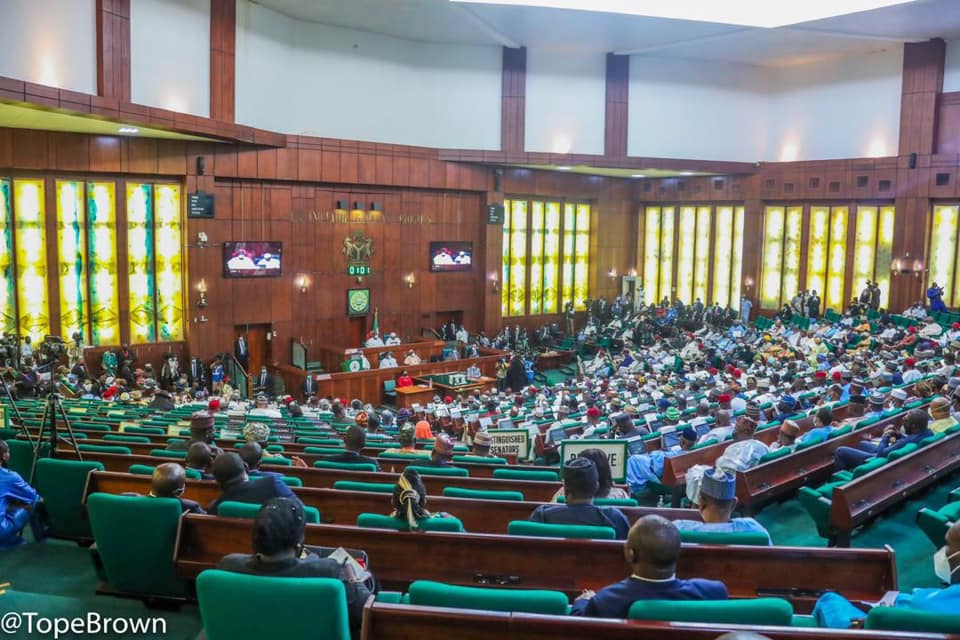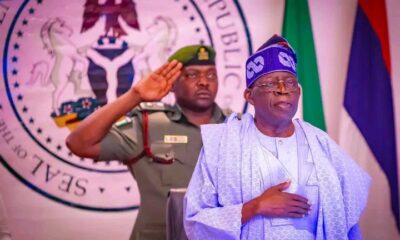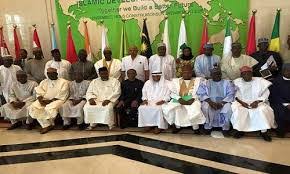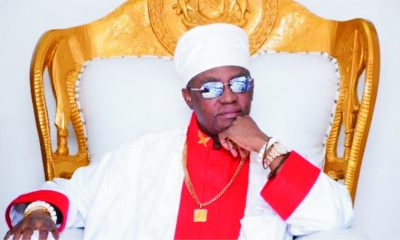Politics
Again, Reps Summon Emergency Plenary, Today

The House of Representatives has again called for an emergency sitting to be held on Monday, April 9, 2022 to discuss critical issues of national importance.
This is the second emergency sitting to be held by the House within one week.
The House had abruptly recalled members from recess to hold plenary last week Wednesday in order to pass some important Bills, so as to meet international deadlines and afterwards adjourned till May 24.
A statement by the Clerk of the House, Dr Yahaya Danzaria, on Saturday, said the House is to hold another emergency plenary on Monday.
“This is to inform all Hon. Members, staff, media and the general public that the House hereby recalls all Hon. Members for an emergency plenary session against Monday, 9th May, 2022 at 2:00pm.
“It is particularly intended to discuss critical issues of national importance. The House regrets any inconvenience this short notice would have caused,” the clerk said.
Although, the clerk did not disclose the specific agenda for the plenary, however, it may not be unconnected with the planned shutdown of flight operations by the Airline Operators of Nigeria (AON) over rising cost of aviation fuel.
The AON had threatened to shut down flight operations in the country by Monday, May 9, 2022 due to the unbearable high cost of aviation fuel (JetA1) from N190 to N700 per liter.
Meanwhile, the Minority Caucus in the House has called on President Muhammadu Buhari to take immediate steps to avert an imminent shutdown of flight operations in the country as such would have grave consequences on national life.
According to a statement by the minority leader, Ndudi Elumelu, the worrisome development in Nigeria, a major producer of oil, was another very sad commentary on the unpardonable failure, corruption, incompetence, negative policies and lack of capacity of the All Progressives Congress (APC)-led administration to effectively manage our national economy.
“As representatives of the people, the Minority Caucus is concerned because aviation is pivotal to the operation, sustenance and survival of other key sectors of the economy and any shutdown of flight operations will have devastating spiral effect and worsen the excruciating economic hardship and further escalate insecurity in the country.
“This is because apart from the direct disabling of thousands of aviation related jobs and ancillary businesses, a shutdown of the sector will also have grave negative impact on critical government and public sector activities which are sustained by air travelling.
“It is instructive to note that the aviation sector is no longer an exclusive reserve of the elite, but plays central role in the movement of personnel and equipment that drive and sustain services and operations which benefit the masses in healthcare, manufacturing, education, food production, telecommunication, retailing, banking and finance, hospitality, entertainment, power, security and other key sectors,” he said.
Elumelu added that a shutdown of the aviation sector would cripple millions of businesses as well as economic and commercial activities thereby increasing unemployment, worsen the economic hardship, put pressure on our already ailing roads and exacerbate insecurity in our country.
“Moreover, the situation is a huge threat to our national integrity as it erodes the confidence of the International Community and foreign investors in our country thereby encouraging the movement of investments to neigbouring countries.
“The Minority Caucus therefore calls on President Buhari to wake up, note the grave import of the situation and save the aviation sector from imminent collapse by immediately addressing the fuel crisis and other challenges in the industry.
“Mr. President should critically address the crisis in the petroleum industry by reviewing the counter-productive policies and curbing the corruption in his administration so as to save our national economy from collapse under his watch,” Elumelu added.
Politics
INEC Denies Registering New Political Parties

The Independent National Electoral Commission (INEC) says it has not registered any new political parties.
The commission gave the clarification in a statement on its X (formerly Twitter) handle last Wednesday.
It described the purported report circulated by some online social media platforms on the registration of two new political parties by INEC as fake.
“The attention of INEC has been drawn to a fake report making the rounds about the registration of two new political parties, namely “Independent Democrats (ID)” and “Peoples Democratic Movement (PDM)”.
“For the avoidance of doubt, the commission has not yet registered any new party. The current number of registered political parties in Nigeria is 19 and nothing has been added,” it stated.
The commission recalled that both ID and PDM were registered as political parties in August 2013.
INEC further recalled that the two were deregistered in February 2020 in accordance with Section 225A of the 1999 Constitution of the Federal Republic of Nigeria.
The commission, therefore, urged the public to disregard the said report.
Politics
You Weren’t Elected To Bury People, Tinubu Tells Alia

President Bola Tinubu has asked Governor Hyacinth Alia to work more for peace and development of Benue State, saying he was elected to govern, not to bury people.
The President said this while addressing stakeholders at the Government House, Markudi, last Wednesday.
He also called on the governor to set up a peace committee to address some of the issues in the state.
The meeting included the Secretary to the Government of the Federation (SGF), George Akume, traditional rulers, and former governors of the state.
The governors of Kwara, Imo, Kogi, Plateau, Ondo, and Nasarawa states also attended the meeting.
“Let us meet again in Abuja. Let’s fashion out a framework for lasting peace. I am ready to invest in that peace. I assure you, we will find peace. We will convert this tragedy into prosperity,” he said.
President Tinubu urged Governor Alia to allocate land for ranching and directed the Minister of Agriculture and Food Security to follow up.
“I wanted to come here to commission projects, to reassure you of hope and prosperity, not to see gloomy faces. But peace is vital to development.
“The value of human life is greater than that of a cow. We were elected to govern, not to bury people”, he stressed.
He charged Governor Alia on working with the Federal Government to restore peace.
“Governor Alia, you were elected under the progressive banner to ensure peace, stability, and progress. You are not elected to bury people or comfort widows and orphans. We will work with you to achieve that peace. You must also work with us”, he said.
In his remarks, Governor Alia appealed to the Federal Government to establish a Special Intervention Fund for communities affected by repeated violent attacks across the state.
“Your Excellency, while we continue to mourn our losses and rebuild from the ashes of pain, we humbly urge the Federal Government to consider establishing a special intervention fund for communities affected by these incessant attacks in Benue State,” he said.
Governor Alia said the fund would support the rehabilitation of displaced persons, reconstruction of destroyed homes and infrastructure, and the restoration of livelihoods, especially for farmers.
He reiterated his support for establishing state police as a lasting solution to insecurity.
The governor pledged his administration’s full commitment to building a safe, stable, prosperous Benue State.
Also speaking at the meeting, the Chairman of the Benue State Traditional Rulers Council, Tor Tiv, Orchivirigh, Prof. James Ayatse, praised President Tinubu for being the first sitting President to personally visit victims in the hospital in the wake of such a tragedy.
He thanked the President for appointing notable Benue indigenes into key positions, including the Secretary to the Government of the Federation and the Minister of Water Resources and Sanitation, Professor Joseph Utsev, while expressing hope that more appointments would follow.
Politics
Gowon Explains Why Aburi Accord Failed
Former Head of State, Gen. Yakubu Gowon (ret’d), says the Aburi accord collapsed because Chukwuemeka Ojukwu wanted regional governors to control military zones.
Gen. Gowon was Nigeria’s military ruler from 1966 until 1975 when he was deposed in a bloodless coup while Ojukwu was military governor of the then Eastern Region in that span.
In a live television interview recently, Gen. Gowon narrated what transpired after the agreement was reached in Aburi, a town in Ghana.
The meeting that led to the accord took place from January 4 to 5, 1967, with delegates from both sides of the divide making inputs.
The goal was to resolve the political impasse threatening the country’s unity.
The point of the agreement was that each region should be responsible for its own affairs.
During the meeting, delegates arrived at certain resolutions on control and structure of the military. However, the exact agreement reached was the subject of controversy.
The failure of the Aburi accord culminated in Nigeria’s civil war, which lasted from July 6, 1967, to January 15, 1970.
Speaking on what transpired after the agreement, Gen. Gowon said the resolutions should have been discussed further and finalised.
The ex-military leader said he took ill after arriving in Nigeria from Aburi and that Ojukwu went on to make unauthorised statements about the accord.
Gen. Gowon said he did not know where Ojukwu got his version of the agreement from.
“We just went there (Aburi), as far as we were concerned, to meet as officers and then agree to get back home and resolve the problem at home. That was my understanding. But that was not his (Ojukwu) understanding,” he said.
Gen. Gowon said Ojukwu declined the invitation, citing safety concerns.
“I don’t know what accord he (Ojukwu) was reading because he came to the meeting with prepared papers of things he wanted. And, of course, we discussed them one by one, greed on some and disagreed on some.
“For example, to give one of the major issues, we said that the military would be zoned, but the control… He wanted those zones to be commanded by the governor.
“When you have a military zone in the north, it would be commanded by the governor of the military in the north, the military zone in the east would be commanded by him. Of course, we did not agree with that one”, Gen. Gowon added.
Ojukwu died on November 26, 2011 at the age of 78.
-
News15 hours ago
I Have No Regrets Over My Life Paths, CharlyBoy Says At 75
-

 News14 hours ago
News14 hours agoFG’ll Unlock Potential Of All States, Says Tinubu
-
Sports18 hours ago
Shaibu Set To Overhaul NIS
-
Business14 hours ago
PINL Awards Scholarships To 645 Persons … Presents Empowerment Packages For Host Communities.
-
Opinion15 hours ago
L’Ouverture:Africa and Echoes of Toussaint
-

 News14 hours ago
News14 hours agoNEF Decries Benue Killings As Genocide, Calls For Probe
-
News15 hours ago
FCCPC Seals France, Belgium, Italy Visa Centre Over Investigation Obstruction, Suspected Unfair Practices
-

 News13 hours ago
News13 hours agoBenin Monarch Receives 119 Stolen Artefacts From Netherlands

